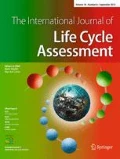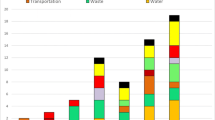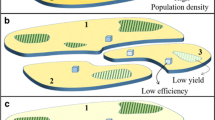Abstract
Purpose
Consequential life cycle assessment (C-LCA) aims to assess the environmental consequences of a decision. It differs from traditional LCA because its inventory includes all the processes affected by the decision which are identified by accounting for causal links (physical, economic, etc.). However, C-LCA results could be quite uncertain which makes the interpretation phase harder. Therefore, strategies to assess and reduce uncertainty in C-LCA are needed. Part of uncertainty in C-LCA is due to spatial variability that can be reduced using regionalization. However, regionalization can be complex and time-consuming if straightforwardly applied to an entire LCA model.
Methods
The main purpose of this article is to prioritize regionalization efforts to enhance interpretation in C-LCA by assessing the spatial uncertainty of a case study building on a partial equilibrium economic model. Three specific objectives are derived: (1) perform a C-LCA case study of alternative transportation scenarios to investigate the benefits of implementing a public policy for energy transition in France by 2050 with an uncertainty analysis to explore the strength of our conclusions, (2) perform global sensitivity analyses to identify and quantify the main sources of spatial uncertainty between foreground inventory model from partial equilibrium economic modeling, background inventory model and characterization factors, (3) propose a strategy to reduce the spatial uncertainty for our C-LCA case study by prioritizing regionalization.
Results and discussion
Results show that the implementation of alternative transport scenarios in compliance with public policy for the energy transition in France is beneficial for some impact categories (ICs) (global warming, marine acidification, marine eutrophication, terrestrial acidification, thermally polluted water, photochemical oxidant formation, and particulate matter formation), with a confidence level of 95%. For other ICs, uncertainty reduction is required to determine conclusions with a similar level of confidence. Input variables with spatial variability from the partial equilibrium economic model are significant contributors to the C-LCA spatial uncertainty and should be prioritized for spatial uncertainty reduction. In addition, characterization factors are significant contributors to the spatial uncertainty results for all regionalized ICs (except land occupation IC).
Conclusions
Ways to reduce the spatial uncertainty from economic modeling should be explored. Uncertainty reduction to enhance the interpretation phase and the decision-making should be prioritized depending on the goal and scope of the LCA study. In addition, using regionalized CFs in C-LCA seems to be relevant, and C-LCA calculation tools should be adapted accordingly.





Similar content being viewed by others
References
Albers A, Collet P, Lorne D et al (2019) Coupling partial-equilibrium and dynamic biogenic carbon models to assess future transport scenarios in France. Appl Energy 239:316–330. https://doi.org/10.1016/j.apenergy.2019.01.186
Aleisa E, Heijungs R (2020) Leveraging life cycle assessment and simplex lattice design in optimizing fossil fuel blends for sustainable desalination. Int J Life Cycle Assess 25:744–759. https://doi.org/10.1007/s11367-020-01738-4
Astudillo MF, Vaillancourt K, Pineau P-O, Amor B (2017) Integrating energy system models in life cycle management. Des Sustain Technol Prod policies from Sci to Innov
Ba D, Boyaci IH (2007) Modeling and optimization i: Usability of response surface methodology. J Food Eng 78:836–845. https://doi.org/10.1016/j.jfoodeng.2005.11.024
Bulle C, Margni M, Patouillard L et al (2019) IMPACT World+: a globally regionalized life cycle impact assessment method. Int J Life Cycle Assess 24:1653–1674. https://doi.org/10.1007/s11367-019-01583-0
Clavreul J, Guyonnet D, Tonini D, Christensen TH (2013) Stochastic and epistemic uncertainty propagation in LCA. Int J Life Cycle Assess 18:1393–1403. https://doi.org/10.1007/s11367-013-0572-6
Damblin G, Couplet M, Iooss B (2013) Numerical studies of space-filling designs: Optimization of Latin Hypercube Samples and subprojection properties. J Simul 7:276–289. https://doi.org/10.1057/jos.2013.16
Dandres T, Gaudreault C, Tirado-Seco P, Samson R (2011) Assessing non-marginal variations with consequential LCA: application to European energy sector. Renew Sust Energ Rev 15:3121–3132. https://doi.org/10.1016/j.rser.2011.04.004
Dandres T, Gaudreault C, Tirado-Seco P, Samson R (2012) Macroanalysis of the economic and environmental impacts of a 2005–2025 European Union bioenergy policy using the GTAP model and life cycle assessment. Renew Sust Energ Rev 16:1180–1192. https://doi.org/10.1016/j.rser.2011.11.003
Dandres T, Gaudreault C, Tirado-Seco P, Samson R (2014) Uncertainty management in a macro life cycle assessment of a 2005-2025 European bioenergy policy. Renew Sust Energ Rev 36:52–61. https://doi.org/10.1016/j.rser.2014.04.042
Draper NR (1997) Response surface methodology: process and product optimization using designed experiments: RH Myers and DC Montgomery, (Wiley, New York, 1995, $59.95, ISBN: 0471581003, pp. 714)
Earles JM, Halog A, Ince P, Skog K (2013) Integrated Economic equilibrium and life cycle assessment modeling for policy-based consequential LCA. J Ind Ecol 17:375–384. https://doi.org/10.1111/j.1530-9290.2012.00540.x
Efron B (1994) Missing Data, Imputation, and the Bootstrap. J Am Stat Assoc 89:463–475. https://doi.org/10.1080/01621459.1994.10476768
European Commission - Joint Research Centre - Institute for Environment and Sustainability (2010) International Reference Life Cycle Data System (ILCD) Handbook-Specific Guide for Life Cycle Inventory Data Sets
Fishbone LG, Abilock H (1981) Markal, a linear-programming model for energy systems analysis: technical description of the bnl version. Int J Energy Res 5:353–375. https://doi.org/10.1002/er.4440050406
Frischknecht R (1998) Life cycle inventory analysis for decision-making. ETH Zurich
Guiton M, Benetto E (2013) Analyse du cycle de vie conséquentielle : identification des conditions de mise en oeuvre et des bonnes pratiques. 1–109
Heijungs R, Suh S (2002) The computational structure of life cycle assessment. Kluwer Academic Publishers, Dordrecht
Heijungs R, Henriksson PJG, Guinée JB (2016) Measures of difference and significance in the era of computer simulations, meta-analysis, and big data. Entropy 18:1–11. https://doi.org/10.3390/e18100361
Herrmann IT, Hauschild MZ, Sohn MD, McKone TE (2014) Confronting uncertainty in life cycle assessment used for decision support. J Ind Ecol 18:366–379. https://doi.org/10.1111/jiec.12085
Huijbregts MAJ (1998) Uncertainty in LCA LCA Methodology Application of uncertainty and variability in LCA Part I : A General Framework for the Analysis of Uncertainty and Variability in Life Cycle Assessment. Int J Life Cycle Assess 3:273–280
International Organization for Standardization (ISO) (2006a) ISO14040:2006 Environmental management-life cycle assessment-principles and framework. 2006
International Organization for Standardization (ISO) (2006b) ISO14044:2006 Environmental management - Life cycle assessment - Requirements and guidelines. 2006
Jacques J, Lavergne C, Devictor N (2006) Sensitivity analysis in presence of model uncertainty and correlated inputs. Reliab Eng Syst Saf 91:1126–1134. https://doi.org/10.1016/j.ress.2005.11.047
Lorne D, Tchung-Ming S (2012) The French biofuels mandates under cost uncertainty - an assessment based on robust optimization. Les Cah l’économie
Loulou R, Remme U, Kanudia A et al (2016) Documentation for the TIMES Model - Part II. IEA Energy Technol Syst Anal Program:1–78
Marvuglia A, Benetto E, Rege S, Jury C (2013) Modelling approaches for consequential life-cycle assessment (C-LCA) of bioenergy: critical review and proposed framework for biogas production. Renew Sust Energ Rev 25:768–781. https://doi.org/10.1016/j.rser.2013.04.031
McGill R, Tukey JW, Larsen WA (1978) Variations of box plots. Am Stat 32:12–16
Mendoza Beltran A, Prado V, Font Vivanco D et al (2018) Quantified uncertainties in comparative life cycle assessment: what can be concluded? Environ Sci Technol 52:2152–2161. https://doi.org/10.1021/acs.est.7b06365
Menten FM, Tchung-ming S, Lorne D, Bouvart F (2015) Lessons from the use of a long-term energy model for consequential life cycle assessment : the BTL case. Renew Sust Energ Rev 43:942–960. https://doi.org/10.1016/j.rser.2014.11.072
Moret S, Codina Gironès V, Bierlaire M, Maréchal F (2017) Characterization of input uncertainties in strategic energy planning models. Appl Energy 202:597–617. https://doi.org/10.1016/j.apenergy.2017.05.106
Muller S, Lesage P, Ciroth A et al (2014) The application of the pedigree approach to the distributions foreseen in ecoinvent v3. Int J Life Cycle Assess. https://doi.org/10.1007/s11367-014-0759-5
Muller S, Mutel C, Lesage P, Samson R (2017) Effects of distribution choice on the modeling of life cycle inventory uncertainty: an assessment on the ecoinvent v2.2 Database. J Ind Ecol 00. https://doi.org/10.1111/jiec.12574
Mutel C (2017) Brightway: an open source framework for life cycle assessment. J Open Source Softw 2. https://doi.org/10.21105/joss.00236
Mutel C, Liao X, Patouillard L et al (2018) Overview and recommendations for regionalized life cycle impact assessment. Int J Life Cycle Assess 24:856–865. https://doi.org/10.1007/s11367-018-1539-4
Nicolas C, Saint-Antonin V, Tchung-Ming S (2014) (How) does sectoral detail affect the robustness of policy insights from energy system models? The refining sector’s example. Econ Work Pap:0–23 https://ideas.repec.org/p/drm/wpaper/2014-56.html
Patouillard L, Bulle C, Margni M (2016) Ready-to-use and advanced methodologies to prioritise the regionalisation effort in LCA. Matériaux Tech 104:105. https://doi.org/10.1051/mattech/2016002
Patouillard L, Bulle C, Querleu C et al (2018) Critical review and practical recommendations to integrate the spatial dimension into life cycle assessment. J Clean Prod 177:398–412. https://doi.org/10.1016/j.jclepro.2017.12.192
Patouillard L, Collet P, Lesage P et al (2019) Prioritizing regionalization efforts in life cycle assessment through global sensitivity analysis: a sector meta-analysis based on ecoinvent v3. Int J Life Cycle Assess:1–17. https://doi.org/10.1007/s11367-019-01635-5
Plevin RJ, Delucchi MA, Creutzig F (2014) Using attributional life cycle assessment to estimate climate-change mitigation benefits misleads policy makers. J Ind Ecol 18:73–83. https://doi.org/10.1111/jiec.12074
Pronzato L, Müller WG (2012) Design of computer experiments: space filling and beyond. Stat Comput 22:681–701. https://doi.org/10.1007/s11222-011-9242-3
Saltelli A (2017) Sensitivity Analysis. In: Numbers for policy: practical problems in quantification. http://www.andreasaltelli.eu/file/repository/Bergen_Andrea_Thursday_SA.pdf
Saltelli A, Tarantola S (2002) On the relative importance of input factors in mathematical models. J Am Stat Assoc 97:702–709. https://doi.org/10.1198/016214502388618447
Saltelli A, Annoni P, Azzini I et al (2010) Variance based sensitivity analysis of model output. Design and estimator for the total sensitivity index. Comput Phys Commun 181:259–270. https://doi.org/10.1016/j.cpc.2009.09.018
Santner TJ, Williams BJ, Notz WI (2013) The design and analysis of computer experiments. Springer Science & Business Media
Udo de Haes Ha, Bensahel J-F, Clift R, et al (1997) Guidelines for the application of life cycle assessment in the EU eco-label award scheme. European Commission
Van der Voort E, Doni E (1984) EFOM-12C Mark I. Energy Supply Model Packag Math Descr Rapp
Vandepaer L, Treyer K, Mutel C et al (2018) The integration of long-term marginal electricity supply mixes in the ecoinvent consequential database version 3.4 and examination of modeling choices. Int J Life Cycle Assess:1409–1428. https://doi.org/10.1007/s11367-018-1571-4
Wei W, Larrey-Lassalle P, Faure T et al (2015) How to conduct a proper sensitivity analysis in life cycle assessment: taking into account correlations within LCI data and interactions within the LCA calculation model. Environ Sci Technol 49:377–385. https://doi.org/10.1021/es502128k
Weidema BP (2003) Market information in life cycle assessment. Environmental Project No 863. Miljøstyrelsen
Weidema B (2005) Geographical, technological and temporal delimitations in LCA. UMIP 2003 method. Danish Ministry of the Environment
Weidema BP, Frees N, Nielsen A-M (1999) Marginal production technologies for life cycle inventories. Int J Life Cycle Assess 4:48–56. https://doi.org/10.1007/BF02979395
Wernet G, Bauer C, Steubing B et al (2016) The ecoinvent database version 3 (part I): overview and methodology. Int J Life Cycle Assess 21:1218–1230. https://doi.org/10.1007/s11367-016-1087-8
Whitefoot KS, Grimes-Casey HG, Girata CE et al (2011) Consequential life cycle assessment with market-driven design. J Ind Ecol 15:726–742. https://doi.org/10.1111/j.1530-9290.2011.00367.x
Xu C, Gertner GZ (2008) Uncertainty and sensitivity analysis for models with correlated parameters. Reliab Eng Syst Saf 93:1563–1573. https://doi.org/10.1016/j.ress.2007.06.003
Yang Y (2016) Two sides of the same coin: consequential life cycle assessment based on the attributional framework. J Clean Prod 127:274–281. https://doi.org/10.1016/j.jclepro.2016.03.089
Zamagni A, Guinée J, Heijungs R et al (2012) Lights and shadows in consequential LCA. Int J Life Cycle Assess 17:904–918. https://doi.org/10.1007/s11367-012-0423-x
Acknowledgments
This work has been conducted with the financial and technical support of IFP Energies nouvelles and of the industrial partners of the International Chair in Life Cycle Assessment (a research unit of the CIRAIG): Arcelor-Mittal, Hydro-Québec, LVMH, Michelin, Nestlé, Solvay, Optel Vision, Total, Umicore. The authors want to thank Reinout Heijungs for his very valuable inputs and as well as the anonymous reviewers whose remarks and good suggestions strongly improved this manuscript.
Author information
Authors and Affiliations
Corresponding author
Additional information
Responsible editor: Marisa Vieira
Publisher’s note
Springer Nature remains neutral with regard to jurisdictional claims in published maps and institutional affiliations.
Rights and permissions
About this article
Cite this article
Patouillard, L., Lorne, D., Collet, P. et al. Prioritizing regionalization to enhance interpretation in consequential life cycle assessment: application to alternative transportation scenarios using partial equilibrium economic modeling. Int J Life Cycle Assess 25, 2325–2341 (2020). https://doi.org/10.1007/s11367-020-01785-x
Received:
Accepted:
Published:
Issue Date:
DOI: https://doi.org/10.1007/s11367-020-01785-x




